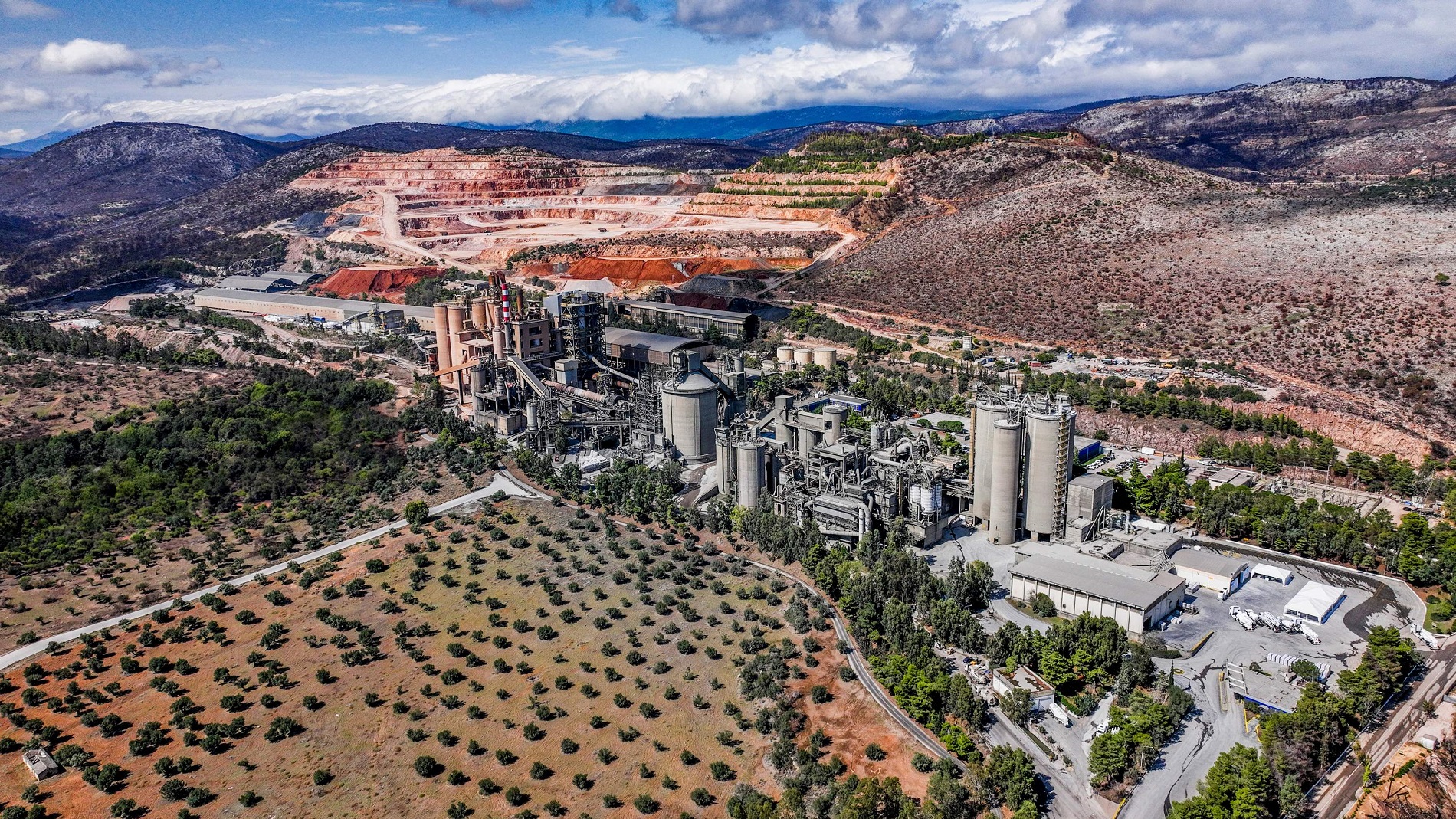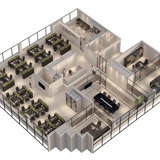Specifically, as stated in a relevant announcement, quarterly sales reached €684 million, marking a 3.4% year-on-year increase, reflecting positive trends across all geographic segments. EBITDA reached a high level of €186.6 million, up 19.9%, supported by stable prices, effective cost management, and improved operational performance.
In Greece, the Group recorded strong sales and EBITDA growth, with significant sales volume increases across most product categories this quarter, in an environment of rising activity in the construction sector. In the U.S., slightly improved market conditions and favorable weather compared to Q3 2024 contributed to higher sales volumes in cement, ready-mix concrete, aggregates, and fly ash sectors.
Maintaining high prices, together with operational synergies and higher volumes, led to increased sales and profits in U.S. dollars both for the quarter and the nine-month period.
Southeastern Europe posted strong Q3 performance, with sales volume increases in most countries and stable prices, reversing the lower performance observed earlier this year. In the Eastern Mediterranean, following the change in the Group’s geographic presence due to the sale of Adocim in Turkey in May 2025, Egypt became the primary source of revenue and profitability.
The country delivered outstanding results, with strong domestic and export sales supported by favorable pricing levels. Group net profit after taxes and minority interests (NPAT) for Q3 reached €102.4 million, compared to €75.9 million in the same period last year, while nine-month NPAT reached €222.7 million, adjusted for the non-recurring €51.9 million loss from the Adocim sale, recorded in Q2 2025, versus €224.6 million in the same period last year.
Thanks to strong Q3 performance, the Group posted high results for the nine-month period, with sales exceeding €2 billion and reaching €2,012.5 million, up 1.4% compared to the same period last year. EBITDA increased by 8.4% (+13% after adjusting for the Adocim sale and foreign exchange impacts) to €473.6 million.
For the nine-month period, domestic cement sales reached 13.2 million tons, up 1.7% after adjusting for the Adocim sale in May 2025 (-1% based on published figures). Ready-mix concrete volumes increased by 4%, while aggregate sales grew strongly by 11%, supported by strategic investments in the U.S. and Greece.
Financing and Investments
The Group’s free cash flow amounted to €307 million during the first nine months of 2025, compared to €275 million in September 2024, reflecting improved EBITDA performance. Capital expenditures remained high, totaling €185 million versus €181 million in the same period last year, highlighting the Group’s continued focus on key strategic priorities, such as improving production capacity and distribution network infrastructure, enhancing the energy mix, and accelerating digital transformation in production—factors that boost operational performance and cost optimization.
During the nine-month period, the Group also made targeted acquisitions of aggregate and alternative cementitious material quarries in Europe, while commissioning a new ready-mix concrete plant in Greece (2024 acquisition), continuing to support major infrastructure projects with mobile ready-mix concrete units. In Q3, the Group made a significant strategic step by entering the precast concrete market, acquiring 80% of Baupartner in partnership with Molins—a leading company specializing in precast concrete products, based in Bosnia and Herzegovina, with operations extending to Croatia and Serbia. This move expands the Group’s geographic presence into a fast-growing market and enriches its product portfolio with value-added solutions aligned with regional growth opportunities.
Meanwhile, Titan America is expanding its product range, having obtained regulatory approval to produce precast concrete products in Florida, paving the way for faster growth and complementing its existing concrete block offerings. Regarding financing, as of September 2025, the Group’s net debt was €302 million, compared to €622 million in December 2024.
This significant reduction was primarily due to proceeds from Titan America’s listing on the New York Stock Exchange and the sale of Adocim. The net debt-to-EBITDA ratio fell to 0.49x despite the payment of €224 million in dividends in July. In October 2025, Fitch upgraded Titan’s credit rating to “BB+ with positive outlook,” recognizing the Group’s improved performance. A new €10 million share buyback program started in July 2025, following the completion of the previous program. Currently, Titan holds 5.0% of the company’s shares.
Market Overview for the Nine-Month Period 2025
United States
In Q3 2025, the Group delivered strong results thanks to improved efficiency from recent targeted investments. Sales volumes of cement, ready-mix concrete, aggregates, and fly ash increased in Q3 due to steady demand in infrastructure projects and commercial real estate, as well as more favorable weather compared to the same period last year.
As expected, residential activity remained subdued. In Florida, strong aggregate market performance offset the residential slowdown, while in the Mid-Atlantic states, increased cement and ready-mix sales contributed to higher revenues compared to last year’s weak quarter. Cost discipline, resilient pricing, and improved sales volumes strengthened the Group’s performance for the quarter. Infrastructure activity remained high due to ongoing federal and state investments. Key indicators for highway and bridge construction remain historically high, underlining the resilience of this sector. Data center construction maintained momentum in commercial real estate, while population migration to suburban areas and trends like business repatriation boosted broader sector demand. Leveraging evolving market conditions, Titan America received approval in September for over 40 new precast concrete products in Florida, enabling expansion beyond concrete blocks. Titan America’s nine-month sales rose 1.1% to $1,264 million, and EBITDA increased 7.6% to $290.1 million. In euros, U.S. sales reached €1,129 million, with EBITDA up 3.6% to €257.5 million.
Greece & Western Europe
The Greek market continued strong performance, maintaining the positive momentum of H1. Cement consumption increased approximately 10%, with Group sales exceeding market levels. Domestic sales volumes rose across all product categories, with notable growth in ready-mix concrete, reflecting Titan’s high level of vertical integration and strategic choice to provide complete solutions, including new value-added products responding to evolving customer needs.
Aggregate sales saw significant growth, as did mortars, supported by the introduction of new products. Prices remained stable across product categories, offsetting increased production and energy costs. The geographic segment’s results were negatively impacted by reduced U.S. exports, although exports to Group import hubs in Western Europe increased, with prices remaining stable. Domestic market growth continues to be supported by numerous large-scale infrastructure projects, where the Group is a preferred supplier. Projects include the Thessaloniki Flyover, copper-gold mine construction with a new ready-mix unit, and ongoing urban development at The Ellinikon.
During the quarter, the Group also commissioned a state-of-the-art concrete plant in Kalamata, acquired in 2024 and fully modernized. This aligns with Titan’s growth strategy, focusing on strengthening the ready-mix segment in high-potential areas. With three acquisitions in aggregates and ready-mix completed this year, the Group confirms a consistent, dynamic investment strategy. Total sales in this geographic segment for the nine months of 2025 increased 14.7% to €384.8 million, with EBITDA up 19.1% to €56.6 million, compared to €47.5 million last year.
Southeastern Europe
Market conditions in Southeastern European countries remained generally stable throughout the year. Following extremely high sales volumes in early 2024, creating a high comparison base, market activity has normalized. This coincided with stronger competition from increased imports in some countries, putting pressure on prices. Nevertheless, the Group increased sales volumes in most markets during the quarter and maintained high profitability margins, thanks to ongoing cost optimization and carbon footprint reduction initiatives that continue to deliver operational benefits.
Bulgaria stood out for its use of alternative fuels, achieving a 65% thermal substitution rate for four consecutive months, while a 5MW photovoltaic plant covered approximately 13% of the company’s energy needs. Overall, the geographic segment’s fundamentals remain strong due to ongoing construction in infrastructure and housing, as well as cross-border large-scale transport projects. Reflecting the region’s long-term growth potential, Titan formed a joint venture with building materials company Molins, as noted above. This step significantly expands the Group’s footprint in Southeastern Europe’s fast-growing construction sector and enhances its product range with value-added building solutions. Nine-month sales for the segment were €313.1 million, versus €315.3 million in the same period 2024, with EBITDA at €114.5 million.
Eastern Mediterranean
Egypt continued its growth trajectory, leveraging strong domestic demand and increasing export activity. Higher domestic and export sales volumes, combined with improved prices, contributed to significantly stronger performance. Construction in commercial and tourism sectors remains the fastest-growing segment, supported by Gulf investments and Egypt’s strategic position as a hub for tourism and distribution networks. Key projects include Ras El Hekma development, commercial areas in the New Administrative Capital, and expansion of hotel capacity along the Red Sea and Mediterranean coasts. Titan’s Alexandria plant, strategically located on the northern coast, has also become a major export hub due to proximity to the port.
The Group is investing in expanding storage facilities to enhance flexibility, enabling the plant to serve domestic and export markets more efficiently. These investments are expected to be completed by year-end. In Turkey, market activity continues to benefit from large-scale reconstruction in southern regions following recent earthquakes, with reconstruction approximately 50% complete. Meanwhile, increasing emphasis on seismic resilience in buildings has supported demand for reinforced concrete















